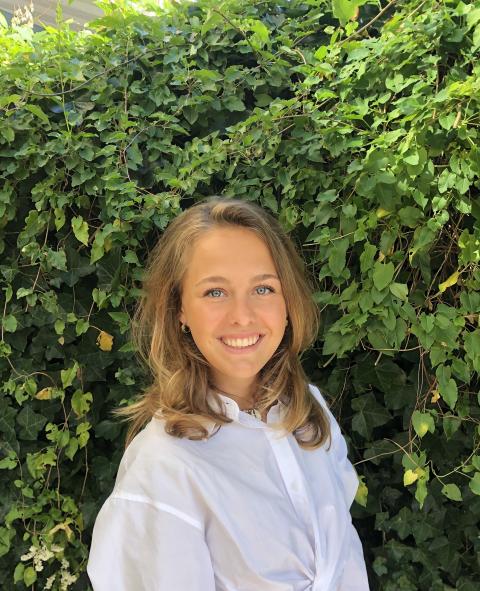New boot camp teaching method defies pigeonholing
Education at Tilburg University is characterized by knowledge, skills, and character. And that is no mean feat at a time when distance education is predominant and students are obliged to stay a good way away from their lecturers − and each other. Researcher and lecturer Kenny Meesters and his colleagues from the Information Management Degree Program have jointly developed a bootcamp to try to close this gap. The bootcamp is an innovative form of online education that explores topical issues, such as how companies, institutions or public bodies deal with disruptive events like the coronavirus crisis and how they make sure that they are fit for purpose. Now and in the future.
Because of the coronavirus crisis, Kenny Meesters was faced with the question of how the university was to provide innovative online education that was in keeping with the Tilburg educational profile of Knowledge, Skills, and Character while observing the coronavirus measures. Meesters: “You can, of course, give your classes and issue your assignments online. But does that make the most of the opportunities? Especially at this time, when we are being forced by circumstances to examine how we teach, I would like us to work on innovation. To look at what is possible, rather than what is not. If we do not, when the coronavirus crisis is over there will come a day when we realize that we simply moved our classes to Zoom and that we have not developed at all. That would be a shame, particularly when other organizations and society in general are developing.”
Cross-pollination
The idea of a bootcamp came from Meesters’ time as an Industrial Engineering & Management student in Higher professional education (hbo). “There it is usual to apply an interdisciplinary approach to projects. The starting point here is that our Information Management degree program is also interdisciplinary in nature. You have separate courses, such as ‘IT Governance’ (Prof. Carol Ou & Dr. Andreas Alexiou), ‘Business Process Integration’ (Dr. Francesco Lelli), and ‘Cyber Security’ (Dr. Joris Hulstijn) but when you provide courses separately, you pigeonhole them. That is detrimental to cross-pollination, particularly at the moment when we are teaching online. Because, in reality, everything is interwoven. In the bootcamp, we deliberately establish links and students learn to research problems from various angles. The professors involved make contributions based on their fields of study. Ultimately, the students are the experts when it comes to content, because they work on a case and combine what they find to form a whole in a paper.”
Topical
Meesters wanted to tie the students’ activities in with current developments. “Our society is undergoing an enormous digital transformation, shops are beginning webshops, employees in large organizations are suddenly working from home, and our buying behavior has changed greatly. This is really interesting for a study like Information Management.” When elaborating the project, he had to take the limited possibilities of the campus into account. “A lot of smaller rooms are not being utilized, relatively speaking. This is why we opted to have students working together in small groups in these rooms, at safe distances, and have different professors and lecturers from our degree program come along to them. Because colleagues from courses the students were not yet taking visited them, this was also an opportunity to get to know each other. The students themselves were able to book rooms and make appointments online, as long as they kept to the rules. The university’s service departments were very helpful with this.”
The nice thing about this is, as a lecturer, that you have no idea what will come up
Putting on a spurt
The hundred and fifty participating students have six weeks in the boot camp so they regularly have to put on a joint spurt. They investigate a research question in groups of five. They can choose from ten themes. “The nice thing about this is, as a lecturer, that you have no idea what will come up. For example, one group working on the theme of Tourism & Recreation investigated the effect of COVID-19 as a disruptive event on platforms in the hotel industry. In concrete terms: the behavior of users of sites such as Booking.com is changing because of the coronavirus measures. What implications does this hold for the intermediaries? Another group, working on the theme of Agriculture & Food, investigated the changes in the supply chain now that people are mainly at home and restaurants are closed for a while.”
The bootcamp assumes that students are enterprising and inquisitive, and are able to devise and design solutions
Mutual feedback
The students discuss their approach with professors and lecturers, investigate their research question, and develop it in a paper. Students collaborate, supported by the professors and course-based knowledge. The groups draw one another’s attention to interesting sources or approaches. “The bootcamp assumes that students are enterprising and inquisitive, and are able to devise and design solutions. If you expect students to take on the role of resourceful, socially-relevant researchers in the future, you have to give it to them now. They are smart young people.” The students give one another feedback while they are writing their papers and the professors subsequently give their comments. At the end of the bootcamp, the groups record a short pitch.
Sharing papers
Ultimately the papers are presented on the university’s New Common website on the corona research. “They are available to the general public for consultation and sharing. This is important because sharing results is part of the researcher’s work. The duration and depth of the study are limited, of course, but a six-week study is hopefully just the start for these students. It may lead to more: an internship or more in-depth research, for example. This is attractive for Information Management students but also for students from other degree programs such as Supply Management or Entrepreneurship. Most of all, I hope that the students will share their work enthusiastically among their own networks.”
Wow, this is such an original approach
Ownership
What makes the bootcamp so much fun? Meesters: “The fact that students have conscious ownership. I address them as fellow researchers. They are responsible for their research; we help and facilitate. I hope, moreover, that they are proud of what they produce. That makes it more rewarding for me. I read papers now and think, ‘Wow, this is such an original approach’. I see that they have acquired insight. That is nicer than having to read the same papers about cloud computing every year.”
Not perfect
The bootcamp was a pilot project. “Things did not always go smoothly. There was justified criticism along the way and I responded to it openly and honestly. It was not perfect and I am not an all-knowing lecturer. But sometimes you just have to take the plunge and say ‘Let’s go for it’. Naturally you run into all kinds of problems, such as not being able to make administrative changes to the curriculum at the end of the academic year. This means that students do not get a grade for the bootcamp in its entirety but it does count for 10% of the final grade for each course. Because no ECTS credits are linked to it, my colleagues and I are not allocated any hours for the bootcamp but we put the hours in because we believe that things will turn out right in the end and that it is important to realize this development. This is our chance to make structural changes to education at the university. The current problem is COVID-19 − the next one may be a cyber attack. What are we learning from this crisis that will help us with those we may face in the future? We need flexibility from the management, professors, and service departments. A great deal of work is being carried out behind the scenes by, for instance, Planning, IT, and the Cleaning personnel, to enable these activities.”
Contact
If you are interested in the bootcamp approach, please contact Kenny Meesters.

Esmee Tijsterman, Master’s student in Information Management
It was very special to be treated as an equal by a professor
“I like new things, so the idea of the bootcamp appealed to me. I was, moreover, happy with the contact with other students now that a lot of lessons are individual and online. The innovative aspects of the bootcamp are the topicality of the themes and the fact that students look at issues from several angles at the same time. It is still a work in progress. We noticed, for example, that our expectations of the first appointment with the professors did not correspond with theirs. We had prepared fairly broad, open questions, whereas they already expected concrete questions. Next time, I would like to achieve more depth − by talking to someone with practical experience, for instance, and asking about the obstacles faced. Because the block was only six weeks long, there was no time for that this time round.”
Professors as colleagues
“It was very special to be treated as an equal by a professor. I really had the feeling that I was able to approach them and exchange thoughts with them over a cup of coffee. We were colleagues. The fact that our paper is going to be published gives me the feeling that we get ECTS credits for our work. I am certainly going to share this via LinkedIn. An international student participated in each group. That was nice because I had been working with practically the same people since I started my Master’s in February. In February 2021, I will be starting on the Data Science program. It would be great to do a bootcamp again because I would get to know some fellow students straight away.”

Alex Muller, Master’s student in Information Management
A visible central thread through the curriculum
“The neat thing about the bootcamp was that it showed the connections between the courses we take by forming a central thread through the curriculum. And I loved that the professors treated us as equals. We sparred with one another and they gave feedback on our work so that we could continue. That role gives freedom and forces you to think critically. Is this a suitable topic to research? Are we tackling it the right way? Normally, you elaborate a case based on a framework, but in the bootcamp you have to invent the wheel yourself. It is, moreover, interesting to work on a current topic. Having said that, it is a challenge because there is so little information to be found.”
High workload
“I found it very pleasant to meet others personally, even if it was at a distance. It makes working together easier and you get to know each other better. If you only work together online, you tend to focus on the assignment whereas, with the bootcamp, you can discuss your ‘coronavirus-time experiences’ at the coffee machine, for example. The fact that the bootcamp was a pilot project was evident from the sometimes late communication and the modification or addition of elements as we went along. The professors obviously had to cope with a few teething problems. I found the workload high, too. I took two courses, participated in the bootcamp, and started my thesis, which was a lot at the same time. And, given the fact that the bootcamp only counts for 10% of each course, I can imagine that some students might opt not to do it. It may be possible in the future to integrate the courses more in the bootcamp. A single bootcamp per semester would mean that students can plan things so that they are not doing the bootcamp in the semester in which they are also writing their thesis.”
The 'New Common'
The corona crisis has compounded major societal challenges. Tilburg University shares knowledge and insights to reshape our society. We are happy to discuss this New Common.
Date of publication: 11 December 2020


